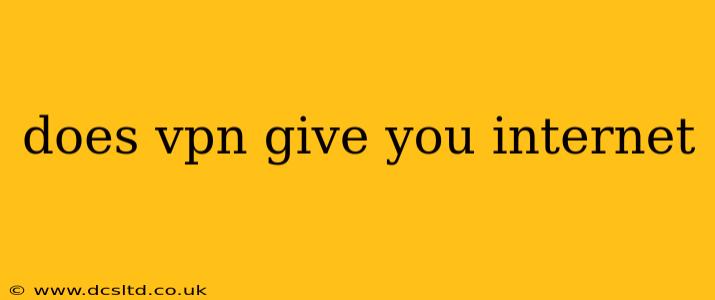Does a VPN Give You Internet? Understanding VPNs and Internet Access
No, a VPN (Virtual Private Network) does not give you internet access in the sense of providing the underlying internet connection. Think of it more like a secure tunnel through your existing internet connection. You still need a separate internet service provider (ISP) – like your cable company, DSL provider, or mobile data plan – to actually get online.
A VPN enhances your existing internet connection by adding several crucial layers of security and privacy. Let's break down how it works:
What a VPN Does:
-
Encrypts Your Data: A VPN encrypts all the data traveling between your device and the VPN server. This is like putting your online activity into a locked box, making it unreadable to anyone intercepting your data, including your ISP, hackers, and government agencies.
-
Masks Your IP Address: Your IP address is like your online address. A VPN masks your real IP address by giving you a temporary IP address from the VPN server's location. This makes it harder for websites and services to track your location and online activity.
-
Provides a Secure Connection: By creating an encrypted tunnel, a VPN protects you from attacks on public Wi-Fi networks and other insecure connections.
-
Circumvents Geo-Restrictions: Some websites and services are only available in specific regions. By connecting to a VPN server in a different country, you can potentially access content that would otherwise be blocked in your location.
What a VPN Does Not Do:
-
Provide Internet Access: You absolutely need an active internet connection from your ISP before you can use a VPN. The VPN simply makes that connection more secure and private.
-
Guarantee Anonymity: While VPNs significantly improve your online privacy, they don't guarantee complete anonymity. Your activities might still be traceable under certain circumstances, depending on the VPN provider's logging policies and the sophistication of surveillance techniques.
-
Make You Untraceable: Law enforcement and other agencies have ways to potentially identify VPN users, although it's considerably more challenging than accessing your data without a VPN.
How Do I Get Internet Access with a VPN?
-
Get an Internet Service: First, you need an internet plan from an ISP. This could be a home broadband connection, mobile data, or even a public Wi-Fi hotspot.
-
Choose a VPN Provider: Select a reputable VPN provider. Research different options and compare features, security, and privacy policies.
-
Install and Connect: Download and install the VPN provider's software on your device. Then, connect to a VPN server in your desired location.
What if my VPN connection drops?
If your VPN connection drops, you'll lose the encryption and IP masking provided by the VPN. Your internet connection itself may still function, but your online activity will no longer be protected.
In summary, a VPN doesn't give you internet; it secures your existing internet connection, making it more private and secure. You'll still need a separate internet connection through your ISP to use a VPN.
